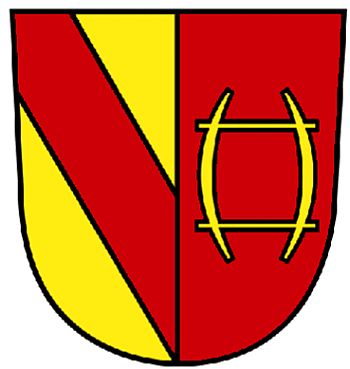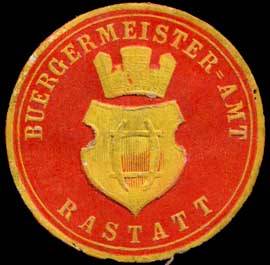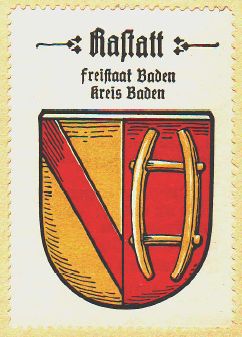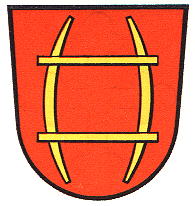Rastatt: Difference between revisions
Knorrepoes (talk | contribs) m (Text replace - "'''Origin/meaning :'''<br/>" to "====Origin/meaning====") |
Knorrepoes (talk | contribs) m (Text replace - "'''Official blason:'''<br>" to "====Official blazon====") |
||
| Line 14: | Line 14: | ||
[[File:rastatt1.jpg|center]] | [[File:rastatt1.jpg|center]] | ||
====Official blazon==== | |||
In geteiltem Schild vorne in Gold ein roter Schrägbalken, hinten in Rot ein goldene Weinleiter (Raste). | In geteiltem Schild vorne in Gold ein roter Schrägbalken, hinten in Rot ein goldene Weinleiter (Raste). | ||
Revision as of 09:31, 1 April 2012
| Heraldry of the World Civic heraldry of Germany - Deutsche Wappen (Gemeindewappen/Kreiswappen) |
RASTATT
State : Baden-Württemberg
District (Kreis) : Rastatt
Additions : 1971 Ottersdorf; 1972 Niederbühl, Plittersdorf, Rauental, 1974 Wintersdorf
Official blazon
In geteiltem Schild vorne in Gold ein roter Schrägbalken, hinten in Rot ein goldene Weinleiter (Raste).
Origin/meaning
The arms are canting, a Raste is a device used by grape-farmers to carry materials.
The village was founded in the 13th century by the Counts of Calw-Eberstein, became a Markt in 1404 and a city in 1700. The oldest seal of the town dates from the early 16th century and shows a shield parted of the arms of Baden and the Raste as a canting symbol. This combination was used until around 1820 when the Baden part disappeared on the seals.
The arms were officially adopted in 1898, nevertheless were the arms with the combination of Baden and the raste still used until the 1930s. After WWII the 1898 arms remained in use, but in 1995 the city returned to the old combines Baden-raste arms.
| The seal of Rastatt with the combination arms from 1510. |
The seal of Rastatt from around 1900. |
| The arms in the Kaffee Hag albums +/- 1925 |
The arms from 1898-1995 |
Literature : Stadler, K., 1964-1971; Zier and Futterer, 1966; John et al. ,1990.




